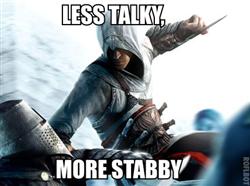 The first Assassin’s Creed was a love it or hate it affair. The game was, to be honest, a proof of concept more than anything else, a playground where Ubisoft could test out a really impressive graphics engine. The game rightly caught flack for its repetitive nature and the general silliness of its sci-fi overtones, but there were a lot of people out there who believed that the series had some merit. The game ended up selling fairly well, so the green light was given on the sequel.
The first Assassin’s Creed was a love it or hate it affair. The game was, to be honest, a proof of concept more than anything else, a playground where Ubisoft could test out a really impressive graphics engine. The game rightly caught flack for its repetitive nature and the general silliness of its sci-fi overtones, but there were a lot of people out there who believed that the series had some merit. The game ended up selling fairly well, so the green light was given on the sequel.
Whereas the original game took place mostly in 1191, the second Assassin’s Creed is set during Renaissance Italy around the late 15th century. While you still control hapless kidnap victim Desmond Miles during some sections of the game, you spend most of your time inhabiting the body of Ezio Auditore da Firenze, a brash young nobleman and banker’s son. The game starts off very similar to Grand Theft Auto where it walks you through a bunch of missions that teach you how the game’s mechanics work while setting up for the first big plot point. Some of the early missions are, admittedly, fairly stale but serve as a good introduction to the setting and some of the major characters you’ll be running across.
Ezio himself is far more likeable than Altair was in the first game. There’s no denying that Altair knew his business, but he wasn’t a sympathetic character. During the course of Assassin’s Creed II you’ll actually be rooting for Ezio as you pilot him through his trials and tribulations and, in a way, you’ll sort of feel like you actually grow with him. While the story does get kind of muddled around the end (I’m fairly sure the gaps in the plot will become downloadable content, but that’s just a guess), Ezio’s tale is full of likeable and hateable characters, and the writing and voice acting are both sharp.
Continue reading Review: Assassin’s Creed II

